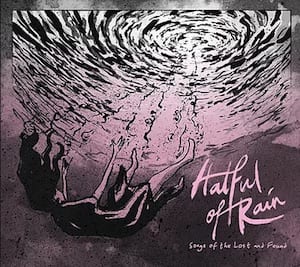 Hatful of Rain – Songs of the Lost and Found
Hatful of Rain – Songs of the Lost and Found
Long Way Home Music – 1 July 2018
For their third album and the second release on their own label, the Brighton-based quartet of Chloë Overton, Phil Jones, Fred Gregory and James Shenton again meld together the Celtic, American and English folk influences that have seen their stock increasingly rise since their debut release back in 2012.
Opening with a repeated skeletal banjo riff and featuring Scott Smith on ebow, Start Again has Overton on lead for an Appalachian-hued song about displacement and sequestration (“I never knew my mother, I was raised here by another who made it clear I should know my place”) , the number picking up pace as, the narrator stowing way aboard a ship in search of a better, the lyrics head into theme of a resilience that chimes with the refugee/migrant zeitgeist and the resonances inherent in the album title.
Again sung by Overton and featuring pedal steel and a Shenton fiddle solo, the melodically easy-rolling Where There’s Life is another number about holding on to hope, interweaving stories of salvation through love, domestic abuse, running from the past, finding means to cope and “holding out for kindness.”
The backdrop shifts to WWI for Devil’s Dyke, a martial beat anchoring a song based on the Battle of the Boar’s Head, near Richebourg l’Avoue on 30 June, 1916. Taking place the day before the Battle for the Somme as a diversionary tactic, it’s been largely forgotten by the war’s official history, but is remembered locally as The Day that Sussex Died as around 70% of the casualties were men from three battalions of the Royal Sussex Regiment, including 12 sets of brothers. Sung from the perspective of the wife of one of those killed, it’s a particularly strong number that chimes with the 100th anniversary of the war’s end, added poignancy coming with the band of the 14/20 Hussars performing Sussex By The Sea.
Sung by Gregory, set to a paradoxically lilting melody and with an intense fiddle solo, Down In The Town is another true story, the scene of the morning after the Lynmouth flood of August 1952 caused a landslide of debris that swept through the village, destroying or damaging over 100 buildings and leaving thirty-four people dead.
One of two instrumentals, Won’t Be Druv, is a lively Appalachian styled banjo and fiddle tune romp, although the title is actually the unofficial motto of Sussex, the other being the more atmospheric Gathering Wood, Shenton’s evocation of foraging on the South Downs.
Another song that references drowning (as also echoed on the cover illustration), only this time metaphorically, sung by Overton Sinking Like A Stone is a jaunty, banjo-based countrified number about a jumped up kid with a headful of dreams finding the grass isn’t necessarily greener, friendless in a town where they mispronounce her name, writing to the folks saying everything’s fine because “I’m just too proud to tell you/That I’m sinking like a stone/The truth is I’m longing to come home”.
Striking another downbeat note sung by Jones with Overton on harmonies with a fiddle-coloured melody that reflects the lyrics about a childhood friend, I Thought You Would Live again addresses how things don’t always work out with lines like “it’s not the cancer that’ll kill you it’s the doubt” and “who knows what we fear when the worst has come true.”
The final leg begins with Overton back on vocals for the wistful But For You’s slow swaying mournful fiddle lament of love and the right time not coming together, the pace abruptly picking up for the sprightly Ponderosa Pine frolic with Chris Aggs on bluegrass banjo. It’s followed by the pizzicato strings-tinted waltzer Oh The Night, an ominous Goethe-inspired fairy tale number about a sleeping town and a father and son riding through a forest full of evil that“No one ever dared to speak out loud and say its name”, the wind weaving whispers through the branches, that, Overton says, serves as an allegory of the modern day nightmares and abuse of trust that plague our culture as she sings “High on the hill toll the bells of St Maria, but nobody tends to her needs/Now they beg for her care and they climb up to greet her – but her door’s long been covered by weeds.”
It ends, however, on a playful note with Collared Dove, Shenton’s wry fiddle lullaby riposte to all those songs extolling the beauty of birdsong as, surely striking chord with anyone reluctantly awakened by the dawn chorus, as Gregory sings “fly away bird and don’t come back your call’s annoying… it’s a fact you are no nightingale.” Its anti-ornithological sentiments might mean they lose out on that Bill Oddie sale, but they can rest assured this is an album sure to have the folk-flock winging its way.
Songs of the Lost and Found is an absolute downpour of riches, their best yet.
Upcoming Tour Dates
22nd June – The Lighthouse, Pool
23rd June – Convivium Festival, Brecon
24th June – Twickfolk, Twickenham
30th June – New Roots, Slaughtered Lamb, London
13th July – The Old Market, Hove
14th July – Titchfield Village Hall, Hampshire
15th July – Square and Compass, Worth Matravers
http://www.hatfulofrain.co.uk/
